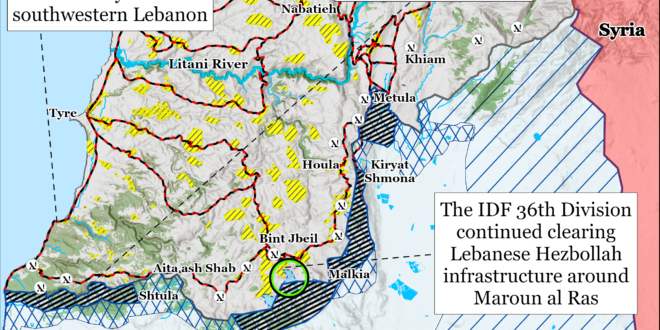The Israel Defense Forces (IDF) deployed a third division—the 91st Division—to southern Lebanon on October 7 for “focused and delimited” ground operations against Lebanese Hezbollah.[i] The 91st Division joins the 36th and 98th divisions in southern Lebanon shortly after Israel announced that it would expand ground operations against Hezbollah.[ii] The IDF 3rd, 8th, and 288th reserve brigades are operating under the 91st Division.[iii] The division is ordinarily responsible for the entire Israel-Lebanon border and has conducted hundreds of attacks from Israel targeting Hezbollah.[iv] Hezbollah reported that it fired upon Israeli forces around the border near Yiftah.[v] Commercially available satellite imagery captured on October 7 similarly indicates troop movements in the area.
The IDF created a fourth closed military zone in Western Galilee on October 7.[vi] The new zone encompasses Rosh Hanikra, Hanita, Admit, Arab al Aramshe, and Shlomi, which is the western-most section of the Israel-Lebanon border.[vii] Most of the border is now a closed military zone. The IDF created closed military zones to the east over the Metula area on September 30, over the Dovev, Tzvion, and Malkia areas on October 1, and over Manara and Yiftah on October 6.[viii]
The IDF Arabic-language spokesperson called on civilians to evacuate immediately from 25 towns and villages in southern Lebanon on October 7.[ix] The spokesperson told residents that they should head north of the Awali River.[x] The spokesperson also ordered Lebanese civilians to keep off the sea and shoreline south of the Awali River.[xi] He said that the IDF Navy would soon operate off the coast against Hezbollah.[xii] Local Lebanese sources reported that Israeli naval ships fired artillery targeting Ras Naqoura in southwest Lebanon.[xiii] The IDF Navy has provided fire support to ground forces operating in the Gaza Strip over the past year.[xiv]
US Central Command Commander General Michael Erik Kurilla met with senior Israeli defense officials on October 5 and 6.[xv] Kurilla spoke with Israeli Chief of Staff Lieutenant General Herzi Halevi, Israeli Defense Minister Yoav Gallant, and other commanders about the recent Iranian missile attack on Israel and other threats facing Israel.[xvi] The IDF reported that Kurilla and Halevi discussed Israeli ground operations into southern Lebanon as well.[xvii]
Senior Iranian officials have continued insisting that Islamic Revolutionary Guards (IRGC) Quds Force Commander Brigadier General Esmail Ghaani is alive but have not yet provided evidence.[xviii] Western and Middle Eastern outlets have suggested that Israel killed or injured Ghaani in an airstrike on Beirut on October 4. IRGC Quds Force Coordination Deputy Brigadier General Eraj Masjedi said on October 4 that Ghaani is “in good health.”[xix] The host of a Palestinian conference in Tehran similarly read a message that was purportedly written by Ghaani on October 7.[xx] Anonymous Israeli military sources told Israeli media that Ghaani was not the target of the IDF airstrike on Beirut and that the IDF was unaware of whether Ghaani was at the location of the airstrike.[xxi]
Hamas issued a statement commemorating the anniversary of its October 7, 2023, attack into Israel and celebrating the other Iranian-backed actors that have begun attacking Israel regularly over the past year.[xxii] This framing is consistent with Hamas leader Yahya Sinwar’s reported desire to ignite a regional war against Israel in order to alleviate Israeli military pressure on Hamas in the Gaza Strip. Hamas, in its statement, praised Hezbollah, the Houthis, Iraqi militias, and West Bank fighters for their regular attacks on Israel.[xxiii] Hamas also boasted that a recent terror attack on the Israel-Jordan border has inspired ”an authentic Jordanian Arab front.”
Hamas separately claimed that it conducted its October 7 attack into Israel in order to preempt an Israeli attack.[xxiv] This appears to be the first time that Hamas has made this claim, raising the question of why it waited until now to make this assertion if it were true. Hamas also threatened to execute more Israeli hostages in its statement commemorating its indiscriminate killing, torture, and abduction of Israeli civilians.
The Iranian National Security and Foreign Policy Committee is preparing legislation that would formalize parts of the Axis of Resistance as an alliance.[xxv] The proposed legislation would establish a “security defense agreement” or ”resistance pact” among Iran and its regional allies, likely Iraq, Syria, Hezbollah, and the Houthis. The agreement would require alliance members to provide “comprehensive economic, military, and political support to each other” in the event of a US or Israeli attack. The Iranian Supreme National Security Council would be responsible for admitting members into the alliance. The legislation also proposes establishing a headquarters to “coordinate operations and military decisions” across the alliance. The legislation finally mentions holding combined military exercises and developing military infrastructure together. The committee will send the legislation to the Iranian Parliament for voting ”soon.” This notional alliance would formalize much of what Iran already tries to do with the Axis of Resistance. Iran views itself as a member and the leader of this informal alliance and coordinates military activities across the alliance through a network of headquarters dispersed across the Middle East.
Key Takeaways:
- Lebanon: The IDF deployed a third division for ground operations against Lebanese Hezbollah in southern Lebanon. The IDF also created another closed military zone in Western Galilee.
- Iran: Senior Iranian officials have continued insisting that IRGC Quds Force Commander Esmail Ghaani is still alive but have not yet provided evidence.
- Gaza Strip: Hamas released a statement commemorating the anniversary of its October 7, 2023, attack into Israel and celebrated other Middle Eastern actors’ attacks on Israel.
- Iran: The Iranian National Security and Foreign Policy Committee is preparing legislation that would formalize parts of the Axis of Resistance as an alliance.
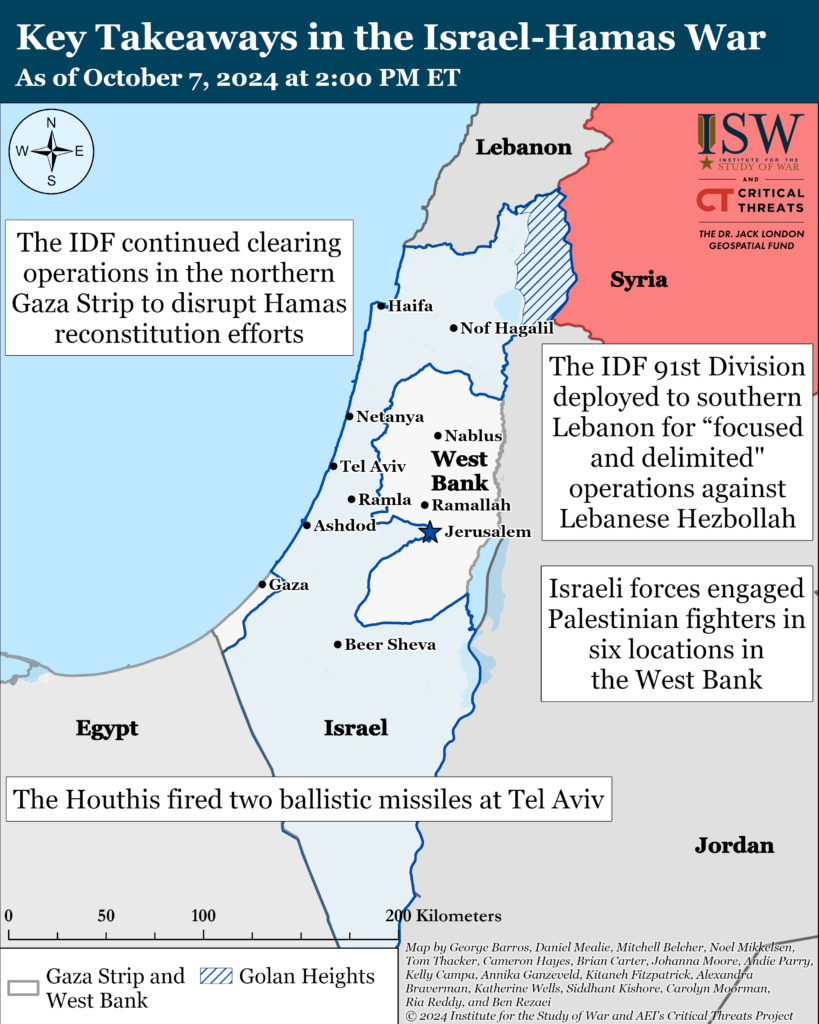
Gaza Strip
Axis of Resistance objectives:
Erode the will of the Israeli political establishment and public to sustain clearing operations in the Gaza Strip
Reestablish Hamas as the governing authority in the Gaza Strip
The IDF continued clearing operations in Jabalia refugee camp, Gaza City, on October 7 after launching a new operation there to disrupt Hamas reconstitution efforts.[xxvi] The IDF Air Force struck dozens of targets, including fighters, infrastructure, and underground tunnels before Israeli forces entered Jabalia.[xxvii] The 162nd Division engaged Palestinian fighters and discovered large amounts of weapons, including grenades, ammunition, and improvised explosive devices (IED).[xxviii] IDF 401st Brigade exchanged fire with two Palestinian fighters in a building before killing them via tank fire.[xxix] Palestinian militias targeted IDF personnel and armor with IEDs, rocket-propelled grenades, mortars, and small arms.[xxx] Hamas fighters detonated an IED targeting Israeli armor and dismounted infantry east of Jabalia camp and then claimed to detonate anti-personnel mines targeting the evacuation force that arrived following the first attack.[xxxi]
The IDF issued evacuation orders for Beit Hanoun, Jabalia, and Beit Lahiya in the northern Gaza Strip on October 7.[xxxii] The IDF told residents to travel to the al Mawasi humanitarian zone in the southern Gaza Strip via two north-south roads.[xxxiii] The IDF had expanded the al Mawasi humanitarian zone on October 6 in advance of issuing these new evacuation orders.[xxxiv] The IDF launched an operation near Beit Lahiya on September 25 to destroy Hamas infrastructure.[xxxv] The IDF last operated in Beit Hanoun in July 2024.[xxxvi]
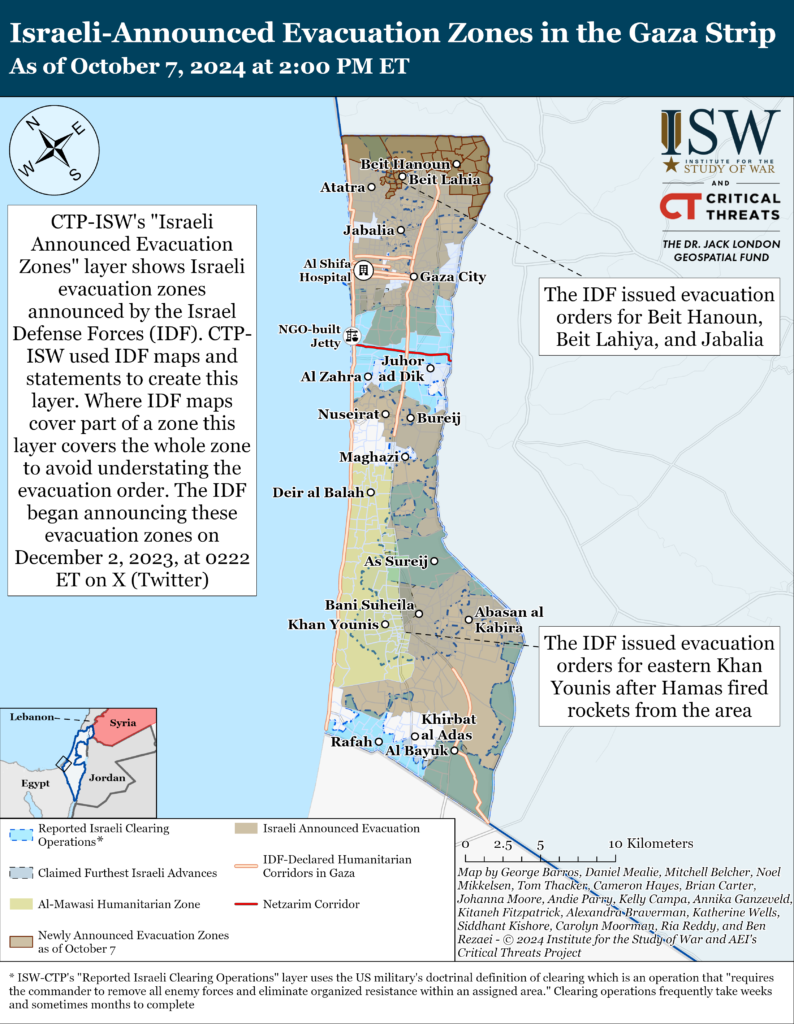
The IDF Air Force struck a Hamas command-and-control site in the central Gaza Strip on October 6.[xxxvii] The IDF stated that Hamas fighters used the Shuhada al Aqsa hospital in Deir al Balah to plan and conduct attacks targeting Israeli forces and Israeli territory.[xxxviii] The IDF added that it took steps to minimize civilian casualties.[xxxix] The Hamas-run Health Ministry reported that the strikes killed 26 civilians.[xl]
Several Palestinian militias launched mortars and rockets targeting Israeli forces and Israeli command-and-control centers around the Netzarim Corridor on October 7.[xli] Five militias noted that they coordinated their attacks targeting the corridor.[xlii] The IDF 252nd Division operates along the corridor.[xliii] The IDF Air Force struck several Hamas targets in the central Gaza Strip that posed a threat to IDF units operating around the Netzarim Corridor.[xliv]
Palestinian militias mortared Israeli forces north of al Bureij camp in the central Gaza Strip three times on October 7. [xlv]
The National Resistance Brigades mortared Israeli forces at the Rafah border crossing on October 7.[xlvi] The IDF Gaza Division is operating along the Philadelphi Corridor.[xlvii]
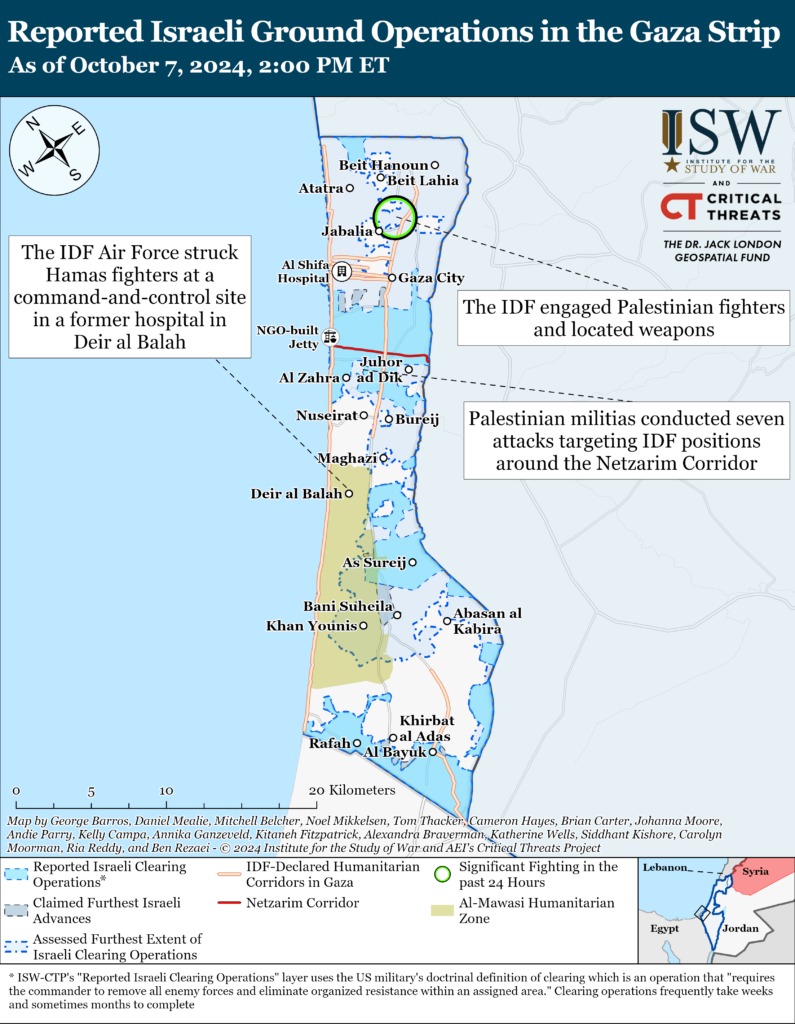
The IDF stated that it thwarted an attempt by Hamas to fire into Israel territory on October 7.[xlviii] An Israeli media correspondent reported that the IDF Air Force struck several Hamas rocket launchers and tunnels throughout the Gaza Strip moments before Hamas had planned to fire rockets into Israel.[xlix] Hamas successfully launched four rockets targeting Sufa with the IDF intercepting three and one landing in an unpopulated area.[l]
Palestinian militias fired at least 14 rockets into southern Israel on October 7.[li] The National Resistance Brigades fired rockets at Ashkelon, and the IDF Air Force struck the launch sites in the northern Gaza Strip.[lii] Palestinian Islamic Jihad (PIJ) launched rockets targeting Sderot and Nir Am in southern Israel with the IDF detecting five rockets that crossed from the northern Gaza Strip.[liii] Hamas launched five rockets from the Khan Younis area that impacted a residential area near Tel Aviv.[liv] The IDF struck the launch site in Khan Younis, causing secondary explosions that indicated additional weapons were stored at the site.[lv] The IDF also issued evacuation orders for the neighborhoods of Bani Suheila, al Mahatta, Sheikh Nasser, and Maan in Khan Younis after Hamas launched the rockets.[lvi]
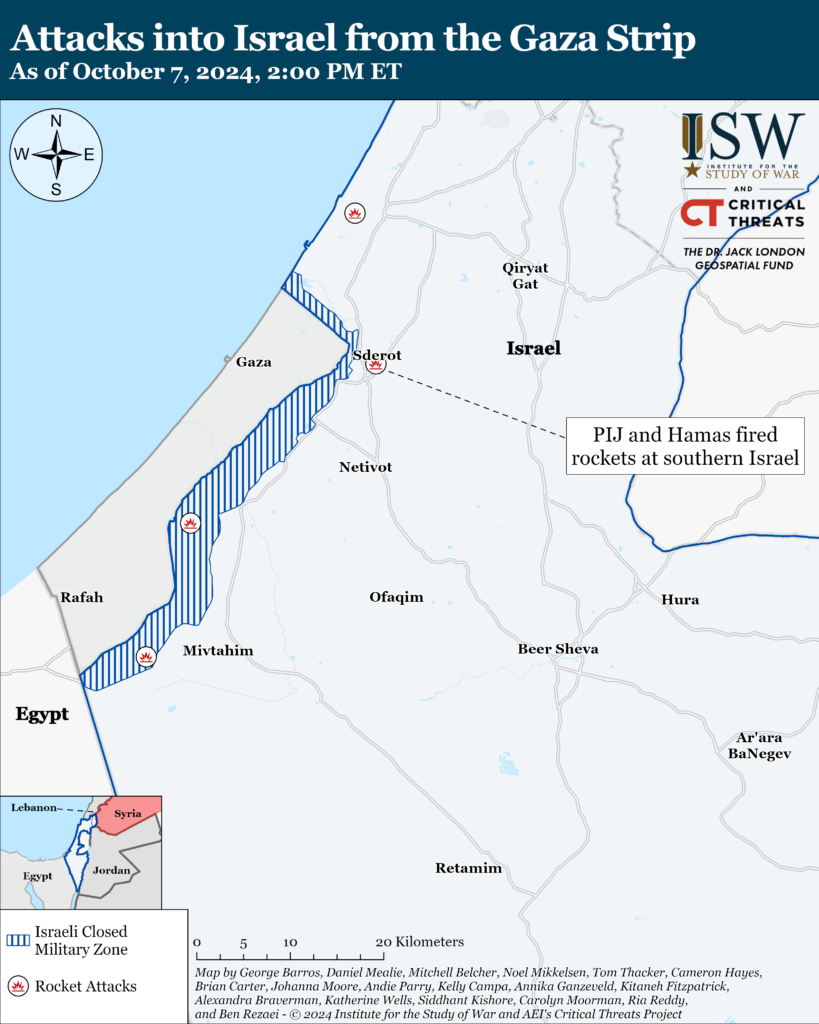
Recorded reports of attacks; CTP-ISW cannot independently verify impact.
The US Treasury Department’s Office of Foreign Assets Control (OFAC) imposed new sanctions against four individuals and 11 entities linked to Hamas’ global fundraising efforts on October 7.[lvii] OFAC sanctioned the following:
Turkey-based Yemeni businessman Hamid Abdullah Hussein al Ahmar is a key member of Hamas’ investment portfolio and is the chairman of Lebanon-based Hamas charity al Quds International Foundation that OFAC sanctioned in October 2012. OFAC also designated the following entitles for being owned, controlled, or directed by Ahmar: Yemen-based Al Ahmar Trading Group, Yemen-based Al Ahmar Oils Supply and Distribution, Yemen-based Sama International Media, Yemen-based Al Salam Trading and Agencies General Establishment, Czech Republic-based Saba, Trade, and Investment S.R.O., Lebanon-based Sabafon International SAL (Offshore), Turkey-based Sabaturk Dis Ticaret Anonim Sirketi, Turkey-based Vivid Enerji Yatirimlari Anonim Sirketi, and Turkey-based Investrade Portfoy Yonetimi Anonim Sirketi.
Italy-based Hamas member Mohammad Hanoun created the fake charity Charity Association of Solidarity with the Palestinian People that funds Hamas’ militarily operations.
Germany-based senior Hamas representative Majed al Zeer generates fundraising for Hamas in Europe.
Austria-based Adel Doughman controls Hamas activity in Austria and represents Hamas at conferences and delegations.
Gaza Strip-based al Intaj Bank is an unlicensed bank that provides Hamas financial services to fund internal operations and to avoid international sanctions.
West Bank
Axis of Resistance objectives:
Establish the West Bank as a viable front against Israel
Palestine Mujahidin Brigades—the militant wing of the Palestinian Mujahidin Movement—claimed responsibility for the shooting attack in Beersheba on October 6.[lviii] The Palestine Mujahidin Brigades claimed that the shooting attack was a ”natural and continuous response” to Israeli military operations in the Gaza Strip, West Bank, and Lebanon.[lix] The group stated that the Israeli Arab gunman belonged to its ”Internal Martyrs Unit.”[lx] The gunman killed an Israeli Border Police officer and wounded ten other civilians before Israeli security forces killed him.[lxi]
Israeli forces conducted raids in several locations across the West Bank on October 6 and 7, as a part of a counterterrorism operation.[lxii] Israeli forces operated in Jenin, Nour Shams refugee camp, Qalandiya, and Tulkarm and detained 45 wanted individuals. Palestinians threw bricks and rocks at Israeli forces in Qalandiya, and Israeli forces fired live rounds to disperse the crowd.[lxiii] The IDF seized five firearms and “tens of thousands” of Israeli shekels in “terrorist funds.”[lxiv]
Israeli forces have engaged Palestinian fighters in at least six locations in the West Bank since CTP-ISW’s last data cutoff on October 6.[lxv] Palestinian militias, including PIJ and al Aqsa Martyrs’ Brigades, fired small arms and detonated IEDs targeting Israeli forces in Nour Shams refugee camp.[lxvi] Israeli forces similarly engaged PIJ and the al Aqsa Martyrs’ Brigades in Jenin City.[lxvii] The al Aqsa Martyrs’ separately attacked the IDF in Balata refugee camp, Nablus, by firing small arms and detonating IEDs.[lxviii] These militia activities mark an uptick in Palestinian militant activity in the West Bank in recent days.[lxix] CTP-ISW did not observe any engagements between Israeli forces and Palestinian fighters in the West Bank from October 1 to 5.[lxx]
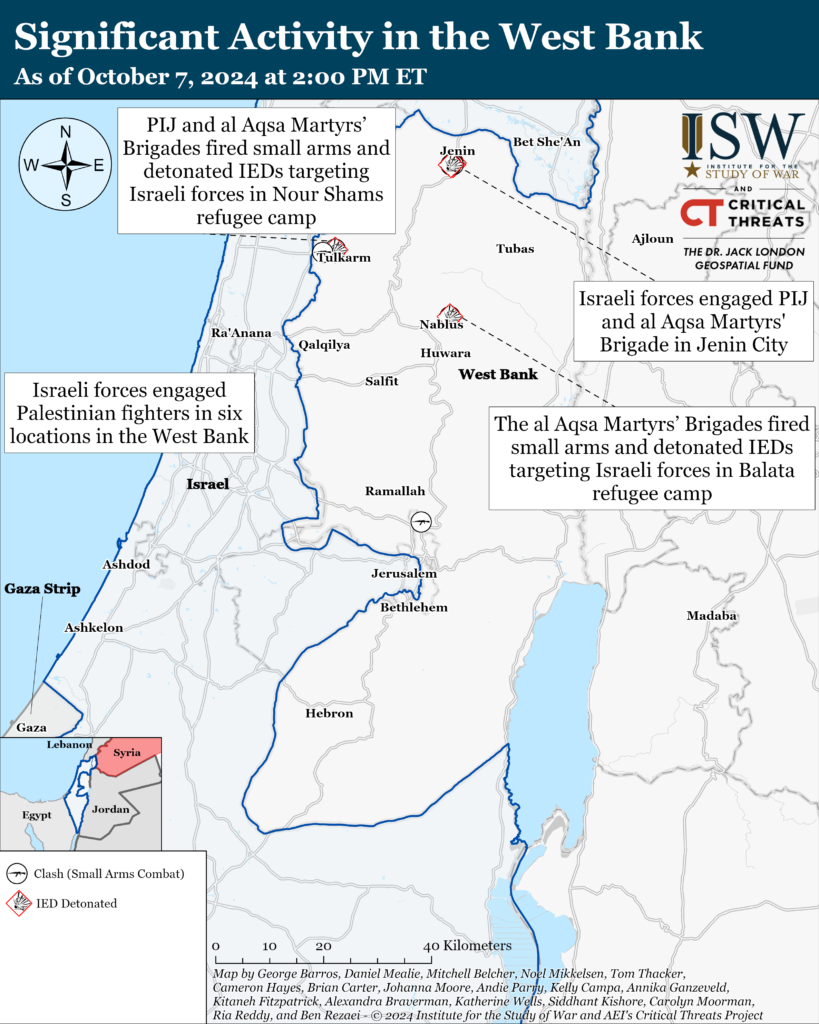
This map is not an exhaustive depiction of clashes and demonstrations in the West Bank.
Northern Israel and Lebanon
Axis of Resistance objectives:
Deter Israel from conducting a ground operation into Lebanon
Prepare for an expanded and protracted conflict with Israel in the near term
Expel the United States from Syria
The IDF 36th Division continued clearing Hezbollah infrastructure around Maroun al Ras on October 7. The Golani Brigade has engaged dozens of Hezbollah fighters and destroyed several tunnels located in civilian buildings.[lxxi] Hezbollah targeted Israeli forces in Maroun al Ras with rocket fire on October 7.[lxxii]
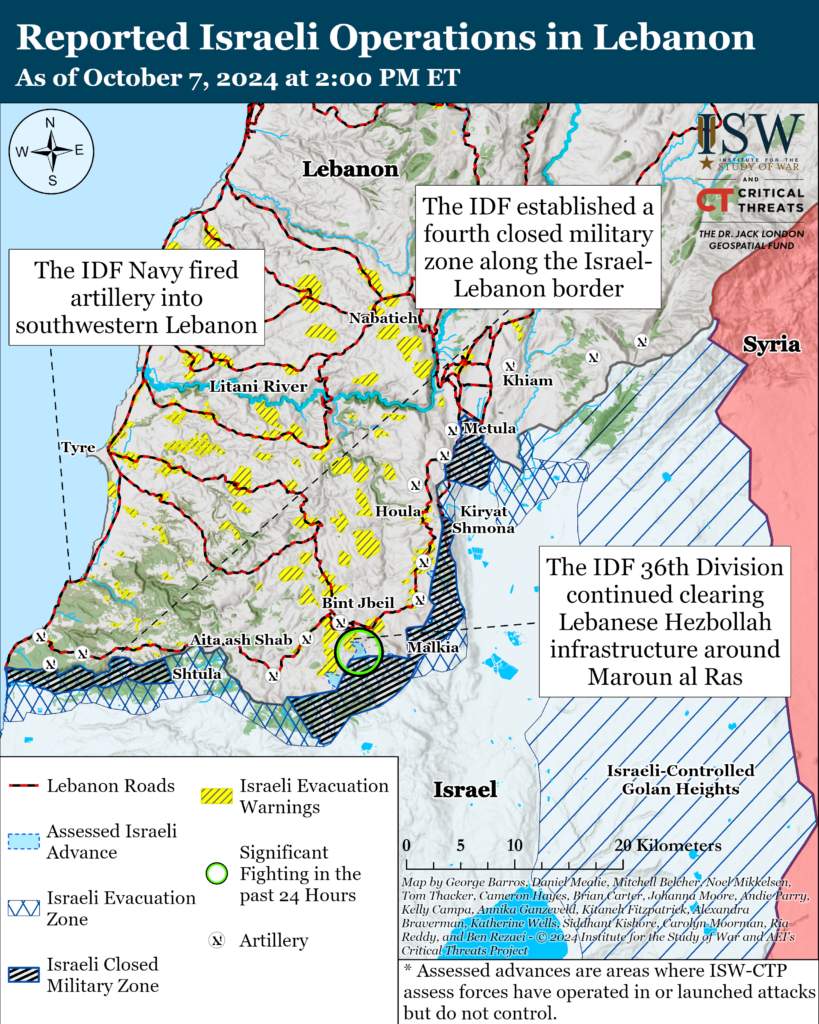
Lebanese Hezbollah has conducted at least 12 attacks into northern Israel since CTP-ISW’s last data cutoff on October 6.[lxxiii] Hezbollah launched several medium-range rockets at Haifa.[lxxiv] Hezbollah also fired about 20 rockets that struck several cars in a parking lot in Kfar Vradim.[lxxv] Hezbollah lastly attacked Israeli forces near Yiftah.[lxxvi]
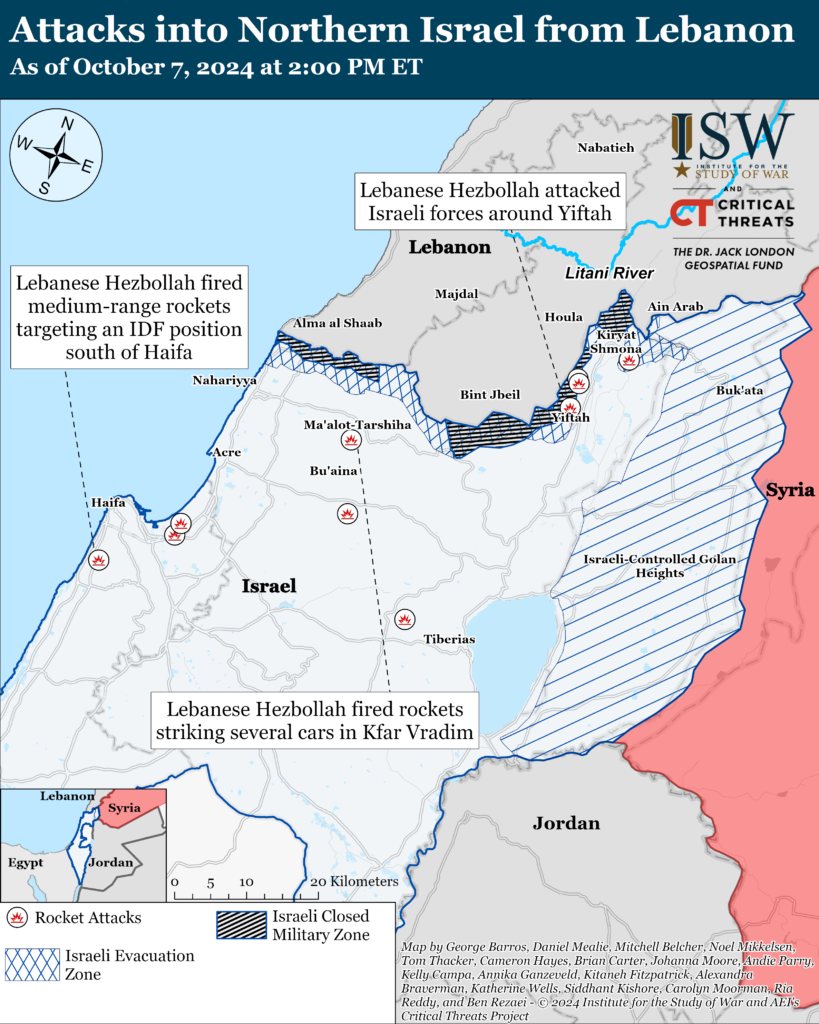
The IDF continued its air campaign targeting Hezbollah capabilities, infrastructure, and leadership. The IDF Air Force conducted a large-scale strike campaign targeting Hezbollah sites in southern Lebanon on October 7.[lxxvii] The IDF stated that it designed the hour-long strike campaign to increase “the damage to Hezbollah’s command, control, and firing capabilities and to assist the maneuvering ground forces to achieve their goals.”[lxxviii] The IDF also struck Hezbollah headquarters and munitions warehouses in Bekka Valley and southern Beirut.[lxxix]
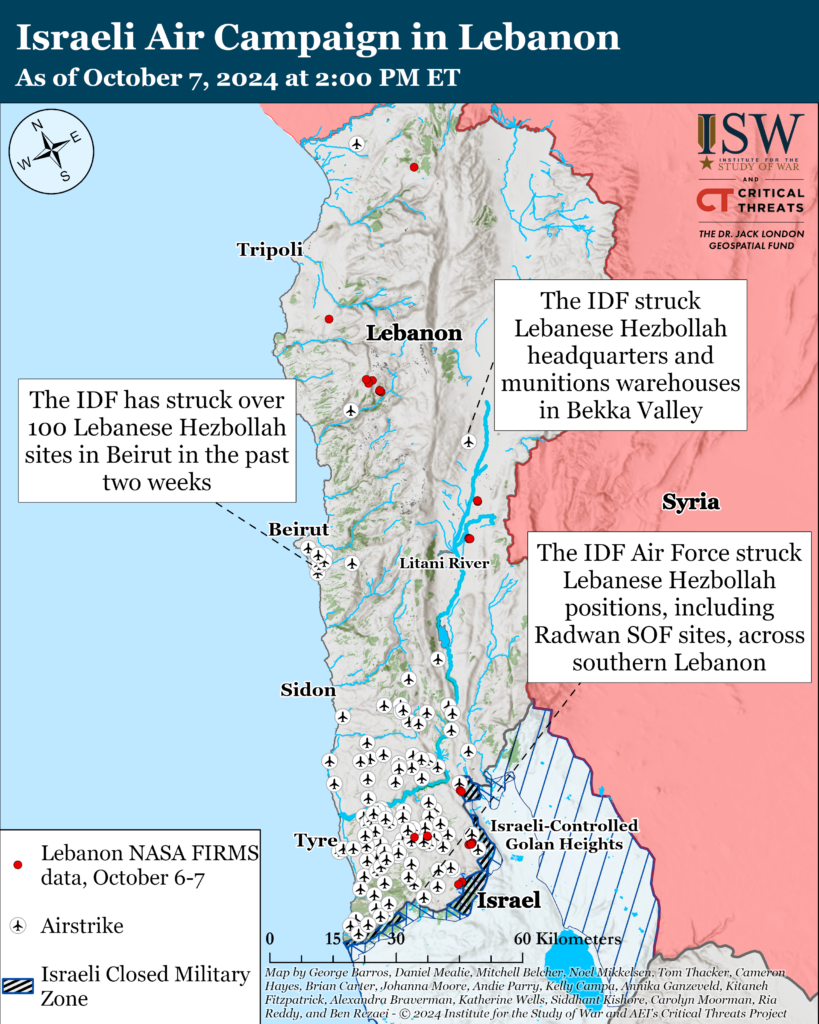
This map illustrates individual Israeli air and artillery strikes based on local Lebanese reporting. This map depicts strikes reported from 2:00pm ET on October 6 to 2:00pm ET on October 7. This map is not exhaustive. CTP-ISW cannot independently verify the locations of Israeli strikes.
Iran and the Axis of Resistance
The Islamic Resistance in Iraq—a coalition of Iranian-backed Iraqi militias—claimed on October 7 that it conducted one drone attack targeting an unspecified military target in Israel.[lxxx] The IDF stated that it intercepted two drones that were launched ”from the east” and triggered alerts near Tel Aviv on the evening of October 6.[lxxxi] The IDF separately stated that it intercepted a drone from the east before it reached Israeli territory on October 6.[lxxxii]
A source from the Iraqi Resistance Coordination Committee—a coalition of Iranian-backed Iraqi parties—told Iraqi outlet Baghdad Today that Iranian-backed Iraqi militias’ operations targeting US forces in Iraq and across the Middle East are “currently suspended.”[lxxxiii] The source added that the Iranian-backed Iraqi militias have agreed not to target US forces in order to avoid escalation in part due to pressure on the militias from Iraqi Prime Minister Mohammed Shia al Sudani and senior members of the Iranian-aligned Shia Coordination Framework to “maintain calm.”[lxxxiv] The source denied that Iranian-backed Iraqi militias conducted the rocket attack targeting US forces near the Baghdad International Airport on October 1.[lxxxv] This claim follows reports from anonymous Iraqi officials claiming that the United States sent “strongly worded” messages to the Iraqi government following the October 1 attack that the United States would target Iranian-backed Iraqi militias if they continued to attack US positions or further escalated against Israel.[lxxxvi]
Houthi spokesperson Yahya Sarea claimed that the Houthis launched two ballistic missiles at Tel Aviv and several Samad-4 drones at Tel Aviv and Eilat on October 7.[lxxxvii] IDF air defenses intercepted a Houthi missile.[lxxxviii] The other Houthi drones and missiles do not appear to have struck any targets.
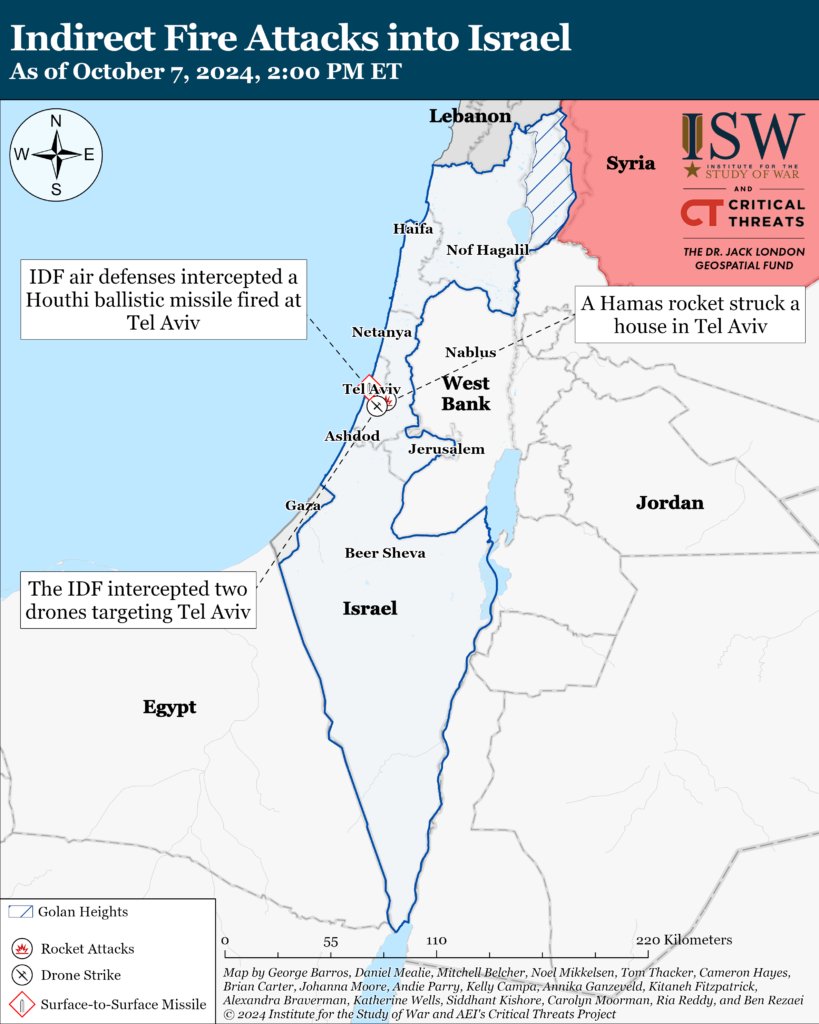
Iranian Foreign Affairs Minister Abbas Araghchi met with senior Syrian officials in Damascus on October 5.[lxxxix] Araghchi emphasized the strategic relationship between Iran and Syria and discussed the recent Iranian ballistic missile attack on Israel in a meeting with Syrian President Bashar al Assad.[xc] Araghchi and Assad discussed how to stop Israeli military operations in Lebanon. Araghchi emphasized his desire to increase bilateral cooperation in a meeting with Syrian Foreign Affairs and Expatriates Minister Bassam Sabbagh.[xci]
Iran is signaling that it could attack sensitive Israeli and regional infrastructure in response to an Israeli attack on Iran. IRGC-affiliated media published on October 7 a list of ten potential targets that Iran could strike in Israel.[xcii] The targets included key economic and military locations.[xciii] IRGC Coordination Deputy Brigadier General Mohammad Reza Naghdi separately said on October 6 that Iran and the Axis of Resistance could “make decisions” that affect the global price of oil, implying they might attack regional energy assets and infrastructure that would increase prices.[xciv]
Iranian President Masoud Pezeshkian will meet with Russian President Vladimir Putin in Ashgabat, Turkmenistan, on October 11.[xcv] Russian media reported that the two will discuss the situation in the Middle East on the sidelines of the ”Interconnection of Times and Civilizations – the Basis of Peace and Development” forum.[xcvi] Pezeshkian and Putin will likely discuss the potential for an Israeli retaliation for the recent Iranian ballistic missile attack on Israel and how Iran would respond.
Iranian Foreign Affairs Minister Abbas Araghchi said that Iran will give a “firm and appropriate response” to any Israeli attack on Iran in a phone call with Egyptian Foreign Affairs Minister Badr Abdelatty on October 7.[xcvii] Araghchi stated that the Axis of Resistance maintains “full readiness” to confront Israeli ground operations in Lebanon.
Iranian President Masoud Pezeshkian discussed the Iranian ballistic missile attack on Israel on October 1 in a phone call with Dutch Prime Minister Dick Schoof.[xcviii]
Supreme Leader Ali Khamenei awarded the Fath (victory) medal to IRGC Aerospace Commander Brigadier General Ali Hajji Zadeh on October 6.[xcix] Khamenei gave Hajji Zadeh the medal for his role in the Iranian ballistic missile attack on Israel on October 1.[c] Notable attendees of the ceremony included Artesh Commander Major General Abol Rahim Mousavi and IRGC Commander Major General Hossein Salami.[ci] IRGC Quds Force Commander Esmail Ghaani was notably absent.[cii]
 Eurasia Press & News
Eurasia Press & News
